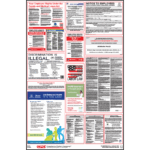New Jersey Expands Civil Rights Protections to Include Breastfeeding

Before leaving office, Governor Chris Christie signed several bills into laws. One of these enacted bills, AB 2294, amends the New Jersey Law Against Discrimination to ban discrimination against breastfeeding employees. Employers cannot refuse to hire, discharge, or discriminate against a breastfeeding employee in compensation and other terms, conditions or privileges of employment. Employers are Read more




